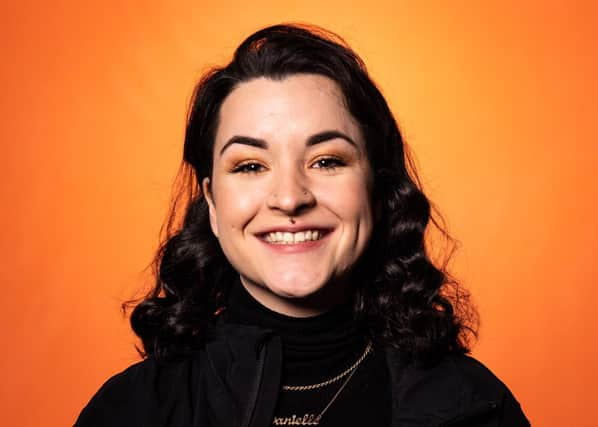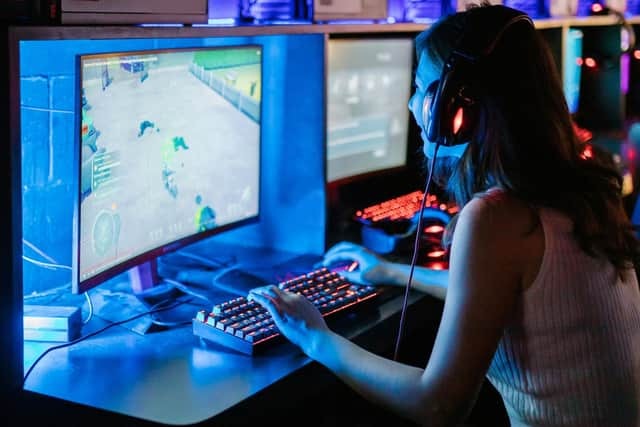What it’s really like to be a female Twitch streamer - and why it’s far from game over for misogyny in the gaming industry


Just last month, a California State department in the US filed a lawsuit against major games company, Activision Blizzard. The lawsuit saw the company responsible for blockbuster games like Call of Duty, Overwatch and World of Warcraft accused of preserving a ‘frat boy culture’ of gender discrimination and sexual harassment.
As with Gamergate - an online targeted harassment campaign waged against women in gaming between 2014 to 2015 - revelations of how prevalent sexism is these industries today shocked many, but came as little surprise to women in STEM, gaming and streaming worldwide.
Advertisement
Hide AdAdvertisement
Hide AdIn Scotland, creators like 27-year-old Sarah have refused to give in to trolls and the swell of harassment faced experienced daily by female Twitch streamers.


Since she started streaming on Twitch as SariaSlays in 2018, Sarah’s channel has amassed more than 12,000 followers - with Sarah’s love of creating variety content on the platform grounded in chatting to viewers while streaming games like Skyrim, Dark Souls and Bloodborne.
“I really liked the instant interactivity of Twitch,” Sarah says.
“Just having long conversations with and getting to meet so many like-minded people has been amazing - and a lot of them are now like my best friends.”
And despite having once thought the platform was for gaming alone, Sarah was delighted to discover that “it's not just about games – you can do whatever you want”.
With Sarah regularly streaming make-up tutorials, charity and community events as well as streams of her favourite horror games, she says: “I feel like as I’ve changed as a streamer, the landscape has changed for me too.
“I’ve found with the new communities I've joined and stuff I've put out on my stream that you get different audiences for different things.”
After becoming a Twitch Partner in 2019, Sarah took her love of curating a streaming community one step further by creating the Rage Club in January 2020.
Advertisement
Hide AdAdvertisement
Hide AdRage Club’s mission is to promote inclusivity, community and charity on the platform, as Sarah and fellow streamers hold charity fundraisers between sharing in the bittersweet frustration that comes with trying and failing to beat notoriously difficult games like Dark Souls.
For Sarah, the Rage Club is all about trying to take back space on the platform and "make sure that this place isn't just a boys club”.
“Over time I’ve felt more empowered to actually fight against the sexist stuff that comes across in chats on Twitch,” she says.
“I think it’s about making sure you curate your community in a way that's inclusive and safe to begin with, otherwise it never will be so.”
Fellow Scottish streamer and Rage Club member Katy has been streaming as ‘thescottishgeek’ since May 2019. Another huge fan of the Soulsborne horror game series, Katy has created a tight-knit community of Dark Souls lovers, letting her indulge in a lifelong love of games and bring people together over her streams.
Having grown up playing mostly console games, Katy, 32, was sceptical of gaming online but found that streaming allowed her to leave a much more isolating world of playing alone on a console behind.
“I’ve made so many friends from all over the world since I started streaming,” she says. “Playing on a console is very much a solo experience, but when you’re on a PC you’ve got a lot more at your fingertips like Discord and you can chat to people and play games at the same time.
“It’s a lot more interactive,” Katy adds.
But this interactivity, critical to Twitch’s appeal, is what also sees female creators and viewers on the platform bombarded with sexual harassment, abuse and trolling.
Advertisement
Hide AdAdvertisement
Hide AdDanielle Barrie, a popular Glaswegian streamer known on Twitch and beyond as Dando, has been streaming for almost four years.
Yet despite loving her career as a streamer and caring deeply for her community of almost 9,000 followers, Danielle does not feel that the platform is becoming safer for female streamers and gamers like herself.
"One of the main reasons why we see harassment against women in particular on Twitch is because men don't think we should be here,” she says.
“They think we are here just for their viewing pleasure and that whatever they ask us to do, we'll do it.”
At 27, Danielle has experienced everything from misogynistic comments, to sexual harassment, to parasocial relationships as part of her Twitch streaming career so far.
“99 per cent of the time on my stream it's a misogynistic comment or an oversexualised remark that will get you immediately banned, but it's incredibly uncomfortable.”
Variety streamer Lindsay Patterson, 26, streaming as Toastie on Twitch, says that the sexualisation of female streamers is something she has often experienced and that it proves incredibly difficult to deal with without a large, supportive community and trustworthy moderators.
“I don’t know what I’d do without my mods,” Lindsay says.
“There's been times when I've been out streaming on my mobile and there’s been horrific abuse and comments in the chat - I panic because the app doesn’t let me do anything about it and my mods aren’t there to help.”
Advertisement
Hide AdAdvertisement
Hide AdBoth Lindsay and Danielle feel that without further action from Twitch, the burden of moderation will continue to fall on women, LGBTQI+ people and people of colour on the platform who bear the brunt of the platform’s abuse.
Twitch’s latest Transparency Report showed that out of millions of harassment, sexual harassment and hateful content reports filed to its human content moderation team, just 80,767 reports saw top-down enforcement action such as user suspensions or bans in 2020 – with creators encouraged to use a range of automated moderation tools provided by Twitch and dedicated unpaid community moderators to keep abuse at bay.
"Community moderation is great,” Danielle says, “but I think the problem is that Twitch is too concerned with the top 10 money makers and streamers on the platform, which are all men.
“Their massive chats of thousands of viewers can often be breeding grounds for misogyny, racism, homophobia and abuse - with people in those chats assuming what goes there can and should fly elsewhere.
“Without a standard set at the top by Twitch, this behaviour trickles down and puts all of the rest of us at risk.”
A Twitch spokesperson said: “We want Twitch to be the safest, most inclusive possible place for live entertainment, and harassment has absolutely no place in our vision for the service.
“Community health is one of our largest areas of investment, and we are continually evolving the policies, tools and technologies that protect community members—particularly when it comes to women and other groups who receive disproportionate levels of abuse online.
"For example, we recently began enforcing an updated hateful conduct and harassment policy that takes a clearer and tougher stance on harassment and sexual harassment.
Advertisement
Hide AdAdvertisement
Hide Ad"In the past year, we also made numerous improvements to reporting and enforcement processes, and quadrupled the number of content moderation professionals available to respond to user reports.
"These measures led to a 96 per cent reduction in median report response time.”
They added: “Safety is not an end state, and we have a number of projects underway to better enforce against behaviours that undermine our community values.
"We are incredibly proud of our creators and moderators, who show up every day to build and maintain the diverse, global communities that make Twitch such a unique place to connect.”
A message from the Editor:
Thank you for reading this article. We're more reliant on your support than ever as the shift in consumer habits brought about by coronavirus impacts our advertisers.
If you haven't already, please consider supporting our trusted, fact-checked journalism by taking out a digital subscription.
Comments
Want to join the conversation? Please or to comment on this article.